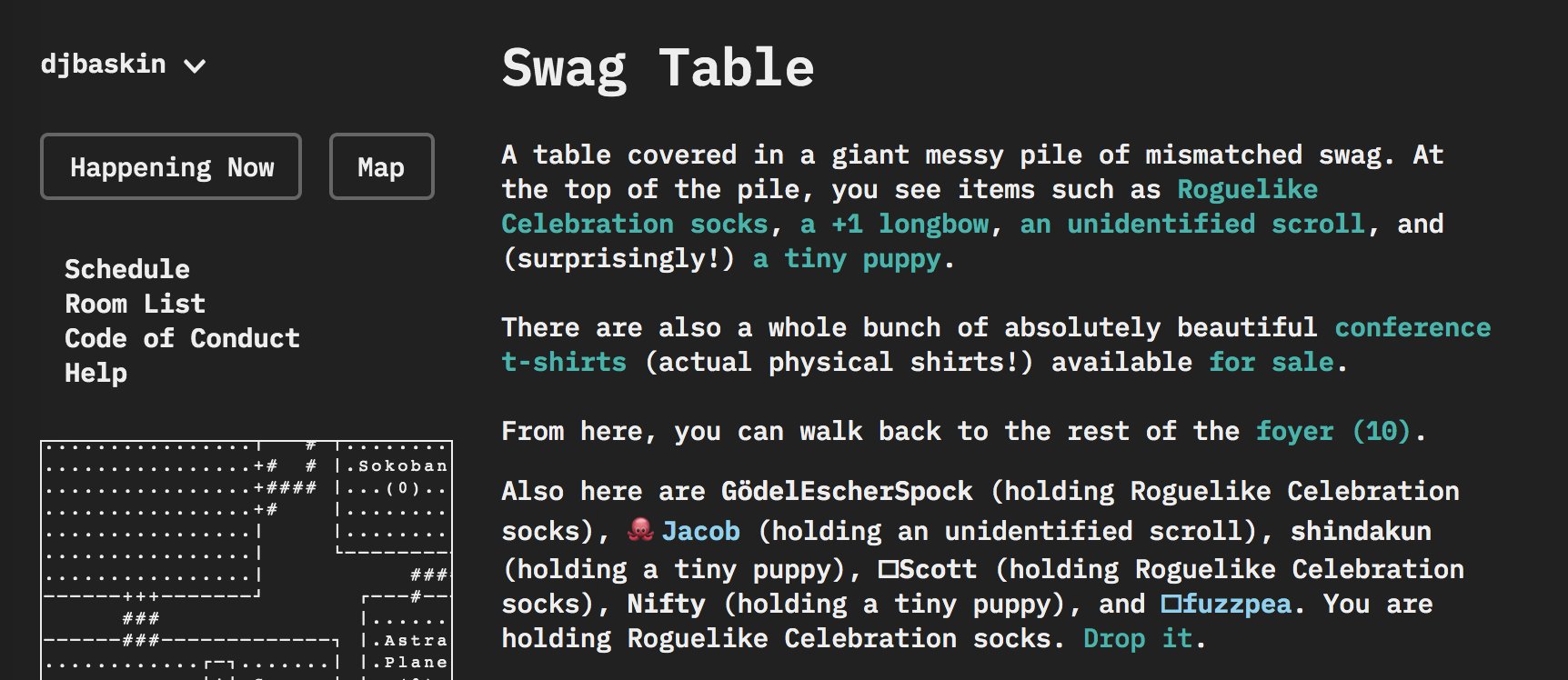Roguelikes
This weekend was the Rougelike Celebration. It's a conference around roguelikes, a video game genre with a long winded history/defintion that happens to be one of my favorites.
Aside from it's subject matter, there are two things I really like it about this conference. The first is it's name. All conferences should be celebrations!
The second, is it's conference space:

from https://twitter.com/djbaskin/status/1312527369962356736/photo/1
It's a custom built MUD (Multi-User Dungeon) for attendees to hang out in. In it you can interact with objects in the world (dispensing food and magical items) or just chat with folks in different rooms, navigable by a massive ASCII map.
MUDs have been around a long time. They're a sort of cousin to the roguelikes. Where roguelikes focus on novelty through random generation and replayability MUDs offload all of that to players, giving space for a rich social sphere.
They're essentially just linked together chatrooms, where messages can be interpreted as commands that make your character do things. If you're in a courtyard room and use the "drop in well" command, you can, well, drop something in the well. It's a very simple premise, that can lead to some incredible stories.
From his ode to a world made in a MUD Robin Sloan writes,
On MicroMUSE, anyone could create, and they could create anything: an object, a room, a house, a chocolate factory. All of this was accomplished using the system’s built-in scripting language, which operated at about the level of Excel macros. It was rudimentary, but rudimentary was just fine for a young teen still new to code.
And
I set out to build a home of my own, a hideout that I called Nib’s Knoll. I created a hill and a mammoth oak tree, and inside the tree I carved out a house. There was a library, lovingly described – you could examine the shelves and see the titles of individual books. There was a lookout post set high in the branches. There was a secret passage. There was a small dragon programmed to follow me from room to room.
I strongly sugget reading that article. It paints a vivid picture of a space built of words and code, that was malleable to any one.
So what would a Modern MUD look like?
There are of course plenty of folks working on new incarnations, but those hew a little too closely the template.
Those MUDs were products of the networks they existed in, if we bring back ideas from them we need to do so in the context of the internet today.
Which brings me to personal websites.
Every time we get together for Internet Homesteading there's this idea floating around of a website as a space. Whether it's explicit "rooms" that visitors can go to, the softer boundary between different types of posts, or just the implicit doors that a hyperlink represents, spatial metaphors are abound.
A personal MUD
What if we lean all the way in and construct those spaces in a MUD? This flips the script a little. Instead of a space hosted on a server for a group of people, in which someone comes to interact, this would primarly be a single user dungeon, that other's could then be invited into.
Taking it further, if you really lean into the idea of a home it's not just a place you create to show other people, or display your things, it's a space you inhabit to carry out the things you want to do. Work, play, socialize. What if we could make it simple to construct "rooms" that had the tools you needed to write, play a game, or organize any action you wanted to take.
A long standing goal of mine, with Fancynote, is to converge the editting and viewing experiences of creating a website. Perhaps the interaction mechanism of a MUD, chatting, moving around rooms, could be a perfect substrate for that.
It's a question of what building blocks to give people. Text-files and documents are one thing, and they're the primitive underpinning most websites today. Rooms and conversations could be another.
As an aside, could even documents and rooms converge some how?
Perhaps the time is right for a resurgance of the MUD. People are spending more time than ever in chat rooms, in Slacks, Discords, twitter (the one giant chatroom).
I'm really excited to try and implement some of these vauge ideas in code. I have a couple tools that I think could be a perfect fit for hacking on it, and I think a simple vision could be pulled out of this scramble of thoughts.
Ultimately the challenge here will be encapsulating the construction of these MUD-like spaces in a very simple API, in order to give people the tools to construct their own spaces, and their own homes.
- Why do I like roguelikes so much?
- What emerges from the intersection of technical challenges and "fun" as a goal?
- Is there a connection between roguelikes and MUDs more than UIs?